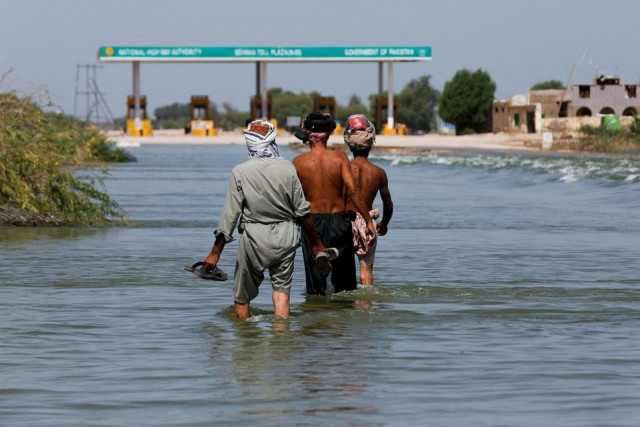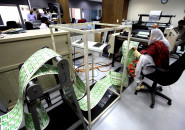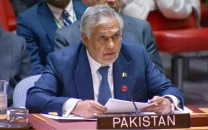Sindh cabinet approves Rs50 billion to build flood-ravaged houses
World Bank has pledged Rs110 billion to construct 1.7 million homes at a cost of Rs160 billion

The Sindh cabinet on Wednesday approved Rs50 billion for the construction of damaged houses in flood ravaged areas.
The meeting, chaired by Sindh Chief Minister Syed Murad Ali Shah and attended by provincial ministers, advisors and special assistants also decided to engage well-reputed NGOs to make the process transparent.
After the meeting, Sindh Information Minister Sharjeel Inam Memon said at a press conference that 1.7 million houses have been damaged by the flood and the construction of all the damaged houses would cost Rs160 billion.
"The houses are being built with the help from the World Bank, which has pledged RS110 billion. The remaining amount is being arranged by the provincial government from the federal government and through donors and other sources," he said, adding that each and every owner of the damaged house would be given Rs50,000 to start the construction, and when the construction would reach the plinth level the remaining amount of Rs250,000 would be transferred to the house owner’s bank account to complete the construction.
Also read: World Bank to provide financial support of $1.3b to Pakistan
During the meeting the issue of subsidy for the rabi crop again came under discussion. CM Advisor on Agriculture Manzoor Wassan told the cabinet that 3.6 million acres of standing crops have been damaged in the recent floods and the farmers have suffered losses worth Rs421 billion.
Wassan said that it was agreed to begin with the provision of free wheat seed for which Rs13.5 billion was required.
He added that the Sindh govt provided Rs8.39 billion while the federal govt was contributing Rs4.7 billion.
About reimbursement of Rs5,000 per acre, Wassan said that Taluka and district committees have been formed for this purpose. A provincial committee is established at DG, Agriculture Extension.
Read more: Floods sweep future from schoolchildren
In order to expedite the process, an additional layer of the committee may be incorporated at tappa level where, tapedars, field assistants of agriculture, members of district council and notables may be added to help in data collection.
The cabinet directed the agriculture dept to collect the data at the earliest so that funds could be provided to the growers.
Village electrification
Sindh Energty Minister Imtiaz Shaikh, presenting the village electrification agenda in the meeting, said that the provincial government was continuously taking necessary measures for the electrification of villages under the Annual Development Programme and villages having a population of 100 souls and above will be selected for electrification process. The preference would be given to villages within half kilometer distance from the HT line.
The cabinet was informed that HESCO has been given Rs6,609.161 million for the electrification of 10,890 villages of them HESCO has provided electricity to 5,108 villages at a cost of Rs5,613.593 million, electrification work was in progress in 337 villages for Rs754.204 million and electrification order for 5,445 villages for Rs6,367.797 million were under feasibility stage.
Imtiaz Shaikh said that Rs151.737 million were in balance, which may be allowed to utilise for the electrification of more villages. The cabinet approved the proposal.
Shaikh told the cabinet that SEPCO was given Rs3,499.634 million for the electrification of over 1.5 million villages. The SEPCO has provided electricity to 2,909 villages for Rs2,952.209 million. Work order has been issued for 3,893 villages, electrification of 3,227 villages has been approved, 151 villages are under the approval stage, and work on 318 villages is in progress.
Similarly, K-Electric has been provided Rs103.180 million with which 12 villages have been electrified.
The cabinet directed the energy dept to expedite the electrification of the villages through Alternative Energy Solutions like Solar PV technology for solarization through mini/microgrids, provision of solar home systems, solar-based streetlights, solar tube wells, and other multiple uses.
The cabinet-approved solarization would be carried out through the Energy Department and the provision of new/additional transformers with allied accessories is also included in the village electrification program.
Formation of media commission
Information minister told the cabinet that the Sindh Protection of Journalists and other Media Practitioners Act, 2021 has been enacted by the Provincial Assembly and notified in August 2021 and its rules have also been notified.
He presented a 14-member draft commission under retired justice Rasheed Rizvi as chairperson with four non-ex-officio members, including secretary Information, Home Secretary, Secretary Law, and nine non-official members - Fahim Siddiqui of KUJ, Kazi Asad APNS, Dr. Jabbar Khatak CPNE, Athar Kazi PBA, Ayaz Tunio Sindh Bar Council, Prof Tauseef Khan HRCP, Shazia Umar MPA, Syeda Marvi MPA, and Ghuma Fariduddin APNEC.
The cabinet approved the formation of the commission.
The home dept presented amendments in Sindh Prohibition of Preparation, Manufacturing, Storage, Sale, and Use of Gutka and Manpuri Act -2019 in the cabinet and said the amendments in the bill were pending before the standing committee of the provincial assembly.
The cabinet approved the amendments as per the order passed by the Sindh High Court, in a Constitutional Petition No. S-349/ 2021, regarding the incorporation of certain additional amendments in the existing Act, in order to create deterrence against unlawful preparation, manufacturing, storage, sale, and use of gutka, manpuri, and betel nuts.



















COMMENTS
Comments are moderated and generally will be posted if they are on-topic and not abusive.
For more information, please see our Comments FAQ